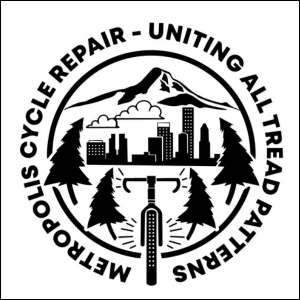
People who live along Northeast 33rd Avenue in the Concordia Neighborhood received a flyer on their doorstep earlier today. The flyer states that the City of Portland plans to remove bike lane striping between Dekum and Holman on December 18th and 19th. (Note: The flyer is not on Portland Bureau of Transportation letterhead because it comes directly from S-2 Contractors, the firm PBOT has hired to do the work.)
The flyer was delivered before PBOT made any announcement about the project but I have just confirmed with the city that the removal will happen. ***Scroll down for updates and comments from PBOT staff***
The first time these bike lanes were slated for removal (November 1st) people stood in front of the contractor’s truck and prevented the driver from moving forward. The spontaneous protest came as bike advocates were caught off-guard and sought to defend a vital link in the bike network between the Holman neighborhood greenway and existing bike lanes over NE Columbia.
The protestors were successful. PBOT paused the removal and chose to do more direct outreach to nearby residents. The reason PBOT claimed they needed to remove the bike lanes in the first place was because of an administrative error. The agency manager in charge of the project, Art Pearce, said people who live on 33rd were told about the new bike lanes only on the morning they were striped. He chalked it up to PBOT simply “dropping the ball.”
In addition to what PBOT says was an oversight in their outreach process, the fact that some of the people strongly opposed to the bike lane are longtime Black residents, loomed over their decision.
For the past month or so, PBOT has left the bike lane in a state of limbo. They’ve left the striping alone, but decided to not enforce parking rules. They have also held individual talks with residents to help inform how best to move forward. According to PBOT, two staffers, Capital Project Manager Scott Cohen and Quick Build Program Delivery Manager Lisa Patterson were the staffers who did the one-on-one outreach. PBOT also hosted a community meeting in early November that they say 16-18 residents attended.
BikeLoud PDX, the nonprofit advocacy group whose members and leaders stopped the removal last month, has also reached out to residents. They passed out a flyer with an invitation to discuss the issue to every house in the project area.
With this new flyer delivered today, it now appears PBOT has made their decision. I have not yet learned why PBOT decided to remove the bike lane but am scheduled to chat with their spokesperson soon. I’ll update this post as soon as I can.
UPDATE: In a phone call with BikePortland a few minutes ago, PBOT Policy, Planning and Projects Director Art Pearce, Capital Project Manager Scott Cohen, and Communications Director Hannah Schafer explained the rationale behind their decision.
Art Pearce:
“We had worked on some additional design options and were hoping that we could navigate some sort of mid-level change [to keep the bike lane in place and satisfy concerns], but in the work of doing the direct outreach, have discovered — I think even more so — the degree to which this un-notified and un-consulted change has touched on a degree of rawness and sensitivity from community members — in particular, the multi-generational Black families that live adjacent to this location.
We believe the only respectful answer at this point is to take a step back, acknowledge the impact (despite our good intentions), remove bike lanes, give this conversation a little bit of time to cool off and then figure out what a path forward should be. But we’re really just not able to have a respectful conversation while we have those facilities still in front of all those homes.
… The plan is that we need to do the removal, but we need to let neighbors know that there’s still an unmet transportation need so we still have to come up with a resolution. But we need to give this a little bit of time.”
Hannah Schafer:
“We still see a need to identify a way to improve the connection in this area, so that’s not off the table, it’s just that we can’t move forward with a constructive conversation with community while the existing bike lanes that were put in without notification are on the ground.
It’s important to emphasize that yes, there is a component of this that is tied to historic disenfranchisement of members of the Black community, but that’s not entirely what this is about. That’s just one component of it. We didn’t just hear from members of the Black community who were opposed to this and were taken aback by the fact that we had put in a bike lane without any notification. It’s really important that this is not a ‘bike versus Black community’ issue.”
Scott Cohen:
“The pain and frustration and anger with the City over past decisions were definitely communicated as part of this and were frankly seen as a line of decision making, not something you know — how we felt — we made a one-off mistake. That was not how it was received.”

